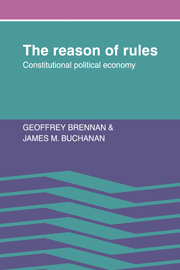Book contents
- Frontmatter
- Contents
- Preface
- 1 The constitutional imperative
- 2 The contractarian vision
- 3 The myth of benevolence
- 4 Modeling the individual for constitutional analysis
- 5 Time temptation, and the constrained future
- 6 Politics without rules, I: Time and nonconstrained collective action
- 7 Rules and justice
- 8 Politics without rules, II: Distributive justice and distributive politics
- 9 Is constitutional revolution possible in democracy?
- Index
7 - Rules and justice
Published online by Cambridge University Press: 05 November 2011
- Frontmatter
- Contents
- Preface
- 1 The constitutional imperative
- 2 The contractarian vision
- 3 The myth of benevolence
- 4 Modeling the individual for constitutional analysis
- 5 Time temptation, and the constrained future
- 6 Politics without rules, I: Time and nonconstrained collective action
- 7 Rules and justice
- 8 Politics without rules, II: Distributive justice and distributive politics
- 9 Is constitutional revolution possible in democracy?
- Index
Summary
Introduction
“Justice” is a familiar value – if an obscure one in much modern discussion. In this chapter, our purpose is to explore the connection between justice and rules and to offer an understanding of the concept of justice that is both coherent and consistent with the broad constitutionalist–contractarian thrust of our position. Our specific claim is that justice takes its meaning from the rules of the social order within which notions of justice are to be applied. To appeal to considerations of justice is to appeal to relevant rules. Talk of justice without reference to those rules is meaningless. If this claim is accepted, it follows that an acknowledgment of justice as a value carries with it, in and of itself, a reason for rules.
In one sense, this emphasis stands much modern discussion of the relationship between justice and rules on its head. Usually, justice is taken to provide an independent norm in terms of which alternative rules or acts can be evaluated. That is to say, orthodox discussion has been preoccupied with the “justice of rules.” Under our alternative conceptualization, rules become the basis of justice: Rules are logically prior.
It is useful to make, at the outset, a distinction between the notion of “just conduct,” on the one hand, and the notion of “just rules,” on the other.
- Type
- Chapter
- Information
- The Reason of RulesConstitutional Political Economy, pp. 97 - 111Publisher: Cambridge University PressPrint publication year: 1986



